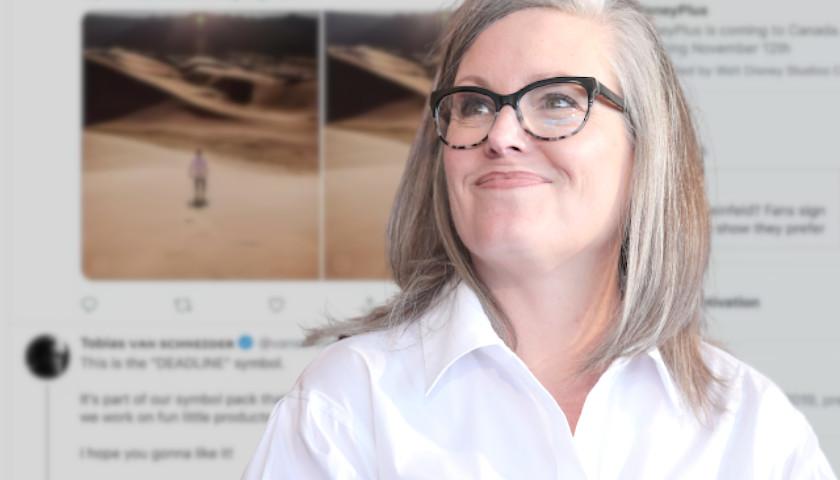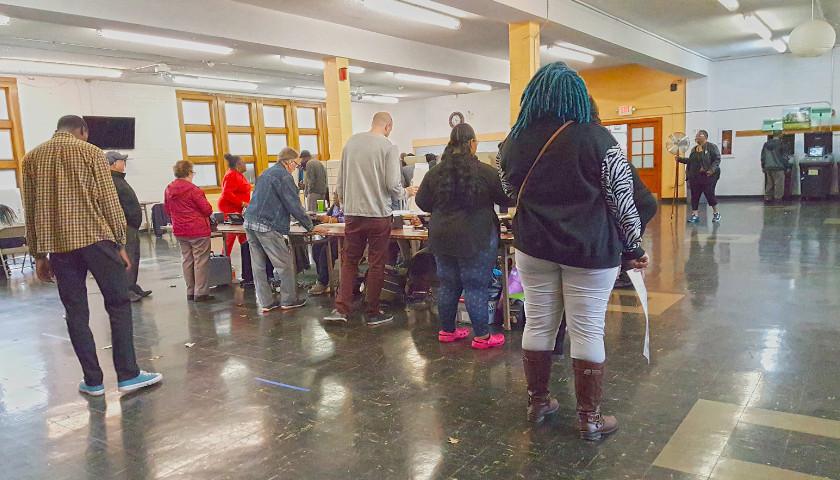Newly released emails reveal that Democratic Governor Katie Hobbs while serving as secretary of state overseeing elections, had her staff pressure social media companies to censor posts by her Republican opponents under the guise of “misinformation.” Her targets included the Arizona Republican Party and former conservative legislator Kelly Townsend.
The AZGOP tweeted, “EXPOSED: @GovernorHobbs has relentlessly censored major entities, including the Arizona Republican Party. Shocked? We’re not. It’s time for transparency and accountability. This goes beyond politics—it’s a matter of principle.”
🚨EXPOSED: @GovernorHobbs has relentlessly censored major entities, including the Arizona Republican Party. Shocked? We're not.
It's time for transparency and accountability. This goes beyond politics—it's a matter of principle.
👀See the proof ➡️ https://t.co/VFJc8cIrWm… pic.twitter.com/F4NBJ5nzjP
— Republican Party of Arizona (@AZGOP) August 10, 2023
Arizona Capitol Oversight (ACO), which released a report about the findings, obtained over 100 pages of emails revealing the collaboration.
Hobbs’ team reported a tweet from AZGOP on December 9, 2020, to the Center for Internet Security (CIS) misinformation team — a nonprofit entity funded through the U.S. Department of Homeland Security’s Cybersecurity and Infrastructure Security Agency (CISA). The tweet quoted a Stop the Steal activist who said, “I am willing to give my life for this fight.” The AZGOP added, “He is. Are you?”
Hobbs’ communications director described the tweet as “deranged and unhinged.” CIS responded and said it had forwarded the tweet to DHS and also contact Twitter.
Hobbs’ team used an official government email address on August 3, 2022, in the midst of Hobbs’ campaign for governor, to try and get another tweet from the AZGOP censored. The tweet said, “Hobbs is failing at her current job…How can she ask anyone to give her a promotion to #AZGOV?” Hobbs’ then-chief of staff, Allie Bonese, emailed CIS and reported it as disinformation.
Hobbs tried to shut down the criticism when concerns arose on Election Day in 2020 that Sharpie brand markers were bleeding through the ballots. Her staff notified the National Association of Secretaries of State (NASS) that she requested a broader censorship tool from Facebook and Twitter since “the ‘sharpie’ posts are out of hand and we can’t stamp them out one at a time.”
NASS responded and instructed Hobbs’ staff to complain directly to CIS since Twitter wouldn’t do much. Later, NASS told Hobbs’ team that CIS had the Sharpies controversy added to a “rumor control page” from CISA.
Facebook “made the hashtag ‘unclickable’” and put “warning labels on the content to limit its reach,” ACO said.
The company asked Hobbs’ team if it wanted to send over any links to posts. Hobbs’ staff sent over a list of links, which included the “comments” section on a news article at KTAR and users questioning a fact check. Facebook added a“false interstitial” notice to the posts. The Facebook representative emailed the team, “I love seeing updates from the Secretary live on CNN!”
Hobbs reported a Facebook post by Townsend on November 12, 2020. Townsend chaired the House Elections Committee and introduced election integrity bills that Hobbs opposed. Townsend posted that day on Facebook that Hobbs improperly “denied” a request from the legislature and used rhetoric that “eroded any hope that the Secretary of State could approach Arizona’s elections in a non-partisan, non-biased manner.”
Later, Hobbs’ team reported the post to Facebook’s misinformation team. Facebook responded and said it did not go against the platform’s Community Guidelines but added a link under the post to its Voting Information Center.
An email from Hobbs’ team to Facebook on November 13, 2020, complained, “Hobbs’ (sic) was recently featured two publications that traffic in conspiracy theories.”
Facebook recommended setting up a phone call to discuss “what is occurring to the Secretary on the platform.” According to ACO, Hobbs’ communications director told a colleague about the call afterward, “it was a bit disappointing.”
On November 15, Hobbs’ team complained to Facebook regarding “falsehoods about Sec Hobbs and her husband.” Facebook refused to take them down, prompting Hobbs’ team to say it was “disappointing.”
One of the requests to Facebook appeared to have erroneously referenced Hobbs’ tweet. In 2017, while Hobbs was a state legislator, she tweeted, “.@realDonaldTrump has made it abundantly clear he’s more interested in pandering to his neo-nazi base than being @POTUS for all Americans.” Hobbs received considerable criticism for comparing Trump supporters to Nazis. On November 13, 2020, Hobbs emailed Twitter complaining about users “harassing” her over “a 3-year old tweet.”
ACO suggested that Hobbs’ taxpayer-funded government staff may have been engaging in illegal political activity. “Of particular note, this ‘3-year old tweet’ came from Hobbs’s campaign Twitter account — she had a separate Twitter account, @SecretaryHobbs, for official business — which suggests that the secretary’s taxpayer-funded staff had begun to use their government emails for campaign purposes,” ACO said.
Hobbs’ team also went after lesser-known individuals. A Facebook account from someone in Tucson with only 160 followers posted “a rambling ‘letter’ allegedly written by a fringe write-in candidate — he received 199 votes compared to his opponent’s 93,388 — who claimed that Kamala Harris was not eligible to serve as vice president.” Hobbs’ communications director reported it to Facebook, which responded and said it did not violate any policies.
In the email chain, Bones slammed Facebook, calling the platform “trash.” The communications director agreed.
According to ACO, NASS also told Hobbs’ team how to report “incorrect or misleading” posts with TikTok. ACO said many auto-generated responses from Facebook and Twitter indicated they had received requests to remove content.
Kari Lake, who is still contesting her election loss to Hobbs, tweeted, “Arizonans deserve the full truth on @katiehobbs‘ censorship ‘Outstanding questions can only be answered through further discovery, legislative subpoenas, & other 3rd-party investigations. This document contains research leads for those who wish to do so.’”
Abe Hamadeh, who is contesting his 280-vote loss to Democrat Kris Mayes for attorney general, tweeted, “Katie Hobbs utter disregard for the rule of law didn’t just start with censorship. She withheld evidence from the court — and then sought sanctions against me for daring to contest the closest race in AZ history with 9,000 uncounted ballots. This is corruption & an abuse of power.” A key part of Hamadeh’s election lawsuit hinges on not having the evidence Hobbs withheld until after his trial had already finished.
Political consultant Brian Anderson, who started ACO, tagged X (formerly Twitter) owner Elon Musk in a tweet thread, “Hopefully @elonmusk can reveal what else Hobbs ordered Twitter to do under its old leadership,” he said. Musk has released numerous internal communications between government officials and Twitter employees engaging in censorship, known as the Twitter Files.
Democratic Attorney General Kris Mayes filed an amicus curiae brief along with 20 other Democratic attorneys general last month supporting the government’s right to collude with social media companies on censorship. The brief was filed in a case where a federal judge barred the federal government from communicating with social media companies after two Republican attorneys general sued.
In 2022, Maricopa County Recorder Stephen Richer worked with CISA, telling them about “media disinformation” regarding elections in Maricopa County. The minutes from the meeting said, “Mr. Richer cautioned that the federal government cannot stay silent and identified a void in the immediate aftermath of the 2020 election that allowed false information to circulate unchecked.”
State Representative Alex Kolodin (R-Scottsdale), an elections attorney, announced after the emails came out that he will be chairing a new Ad Hoc Interim Committee on Oversight, Accountability and Big Tech to investigate. It will focus on “emerging legal and constitutional issues surrounding censorship by government officials and social media interference, big tech manipulation of internet platforms, and the use of artificial intelligence.” The committee will hold its first public meeting on September 5, 2023, featuring expert testimony.
– – –
Rachel Alexander is a reporter at The Arizona Sun Times and The Star News Network. Follow Rachel on Twitter. Email tips to [email protected].
Photo “Katie Hobbs” by Gage Skidmore. CC BY-SA 2.0.





